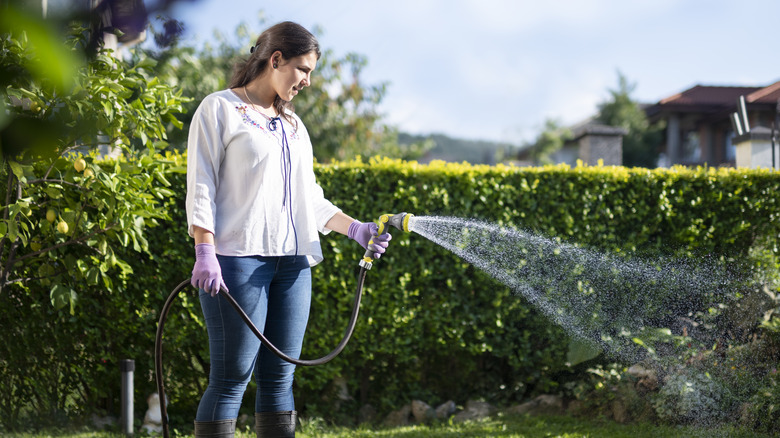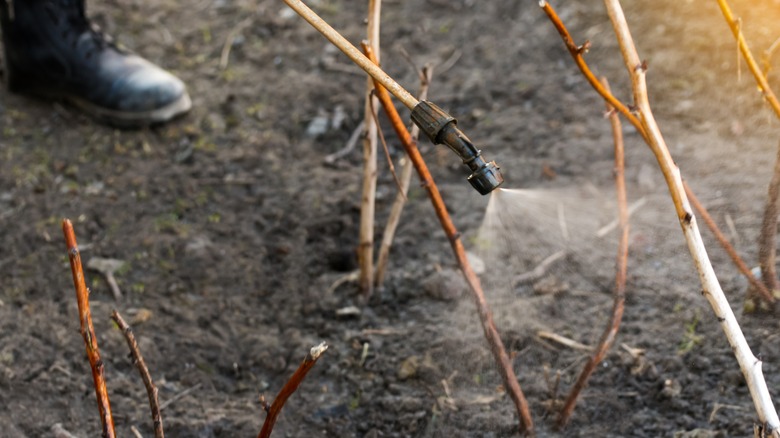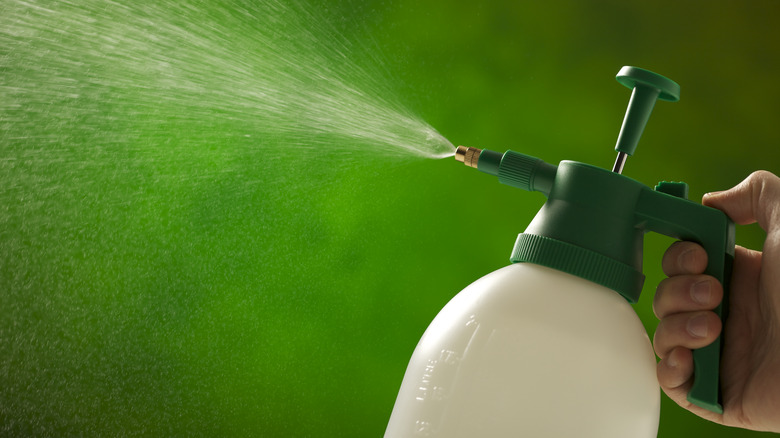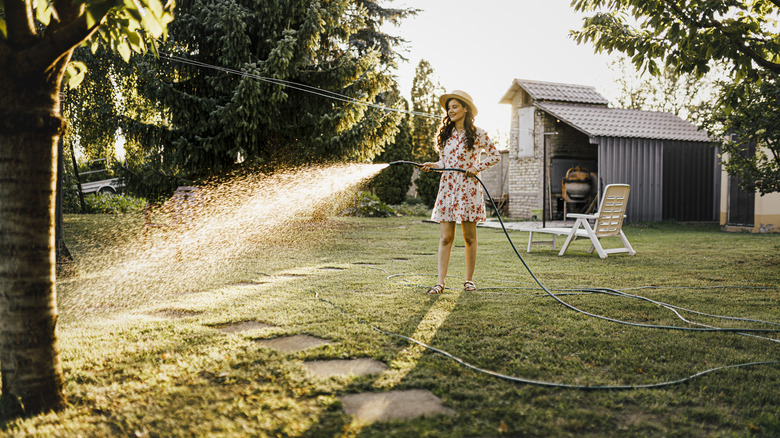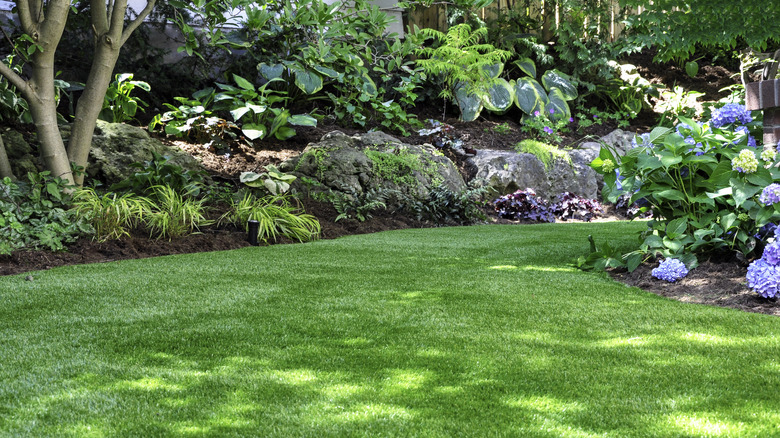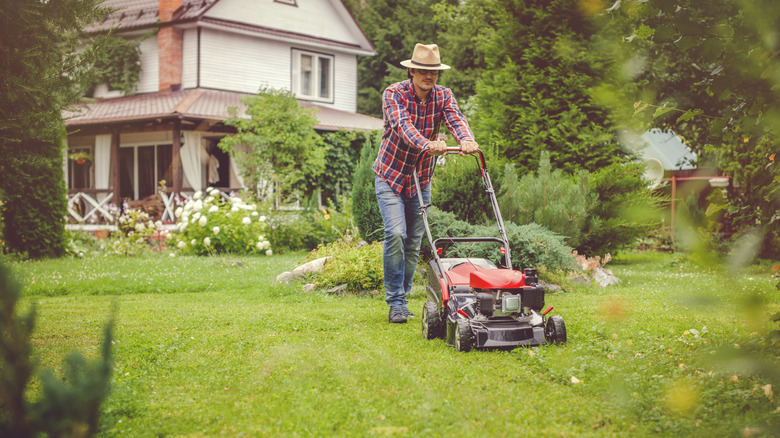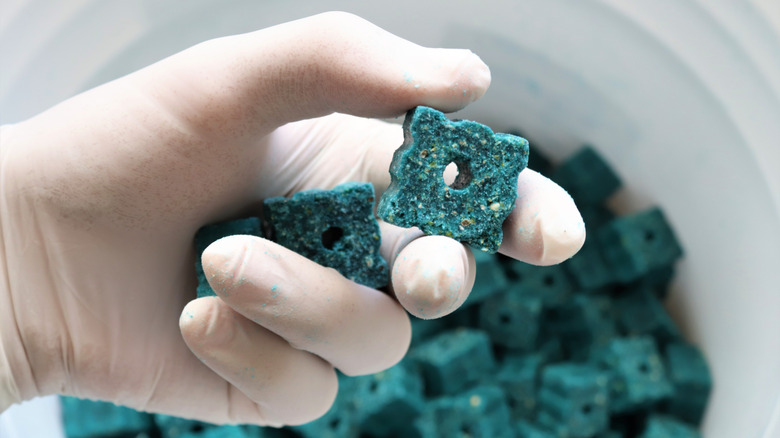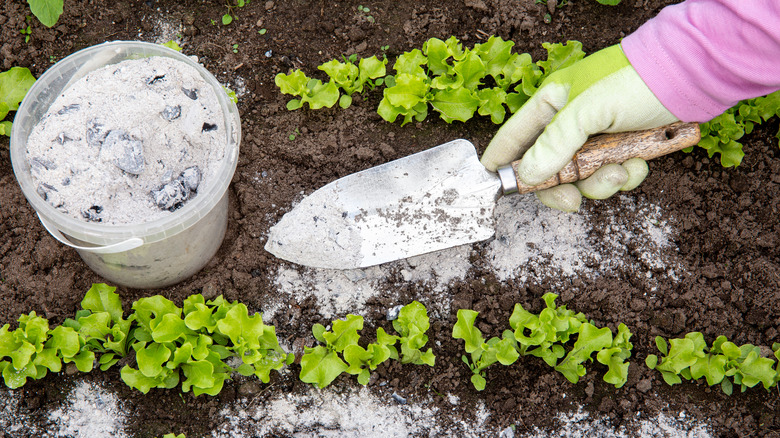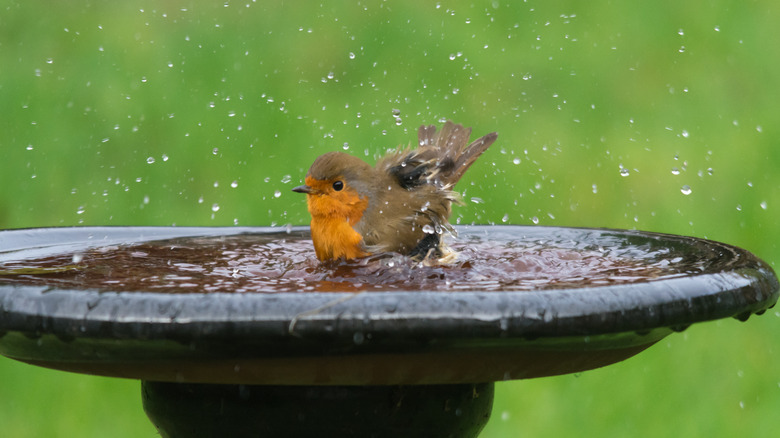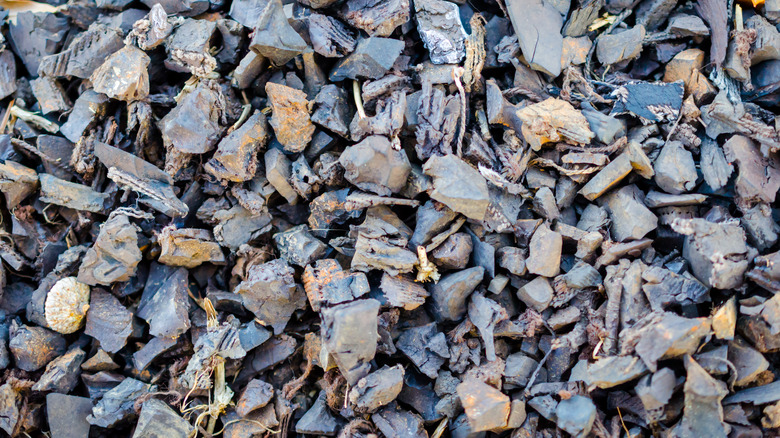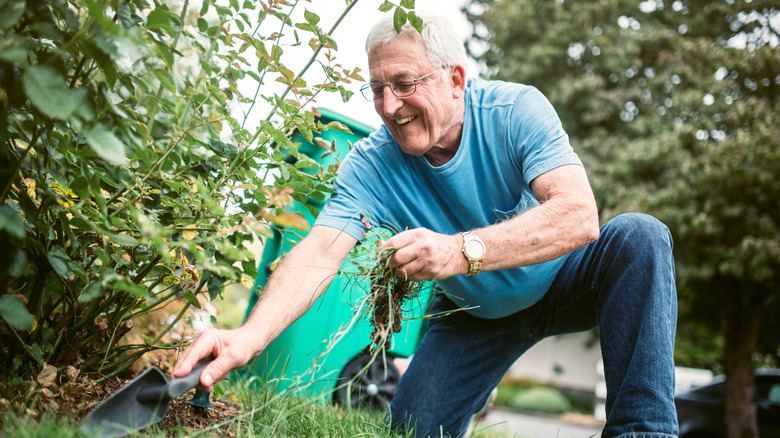Think Twice Before Using These 10 Items In Your Yard
A house without a yard is like a day without a night. It feels incomplete. As anyone lucky enough to have a sprawl or patch of grass outside their back door knows, yards are a special place. Among the flowers, compost heaps, garden gnomes, decking, patios, water features, stray hedgehogs, and ornamental statues, there's a rare and reassuring magic to be found. A soul can find both serenity and sanctuary in the shelter of their yard, but if they're not careful, they can also find misery and ruin too.
A yard is your own personal realm. A strip of land where you are sovereign. And as any ruler worth their salt knows, a kingdom cannot thrive or survive without proper care and maintenance. We all strive to do what's right by our yard and continually improve its overall aesthetic and well-being. However, there are times when we are at risk of unwittingly damaging our yards. We all use a host of items to improve and cultivate its appearance. Yet sometimes you can be destroying that which you love by remaining blissfully unaware of the damage certain products and tools could be inflicting. Worse still, you could be putting your health at risk. Here are the items you should always think twice about using in your yard.
1. Fertilizers with the wrong pH balance
As all green-fingered enthusiasts know, fertilizers can have a life-affirming effect on your plants. As most soil does not provide adequate nutrients for plants to fulfill their optimized growth, a little fertilizer is just the ticket. The macro elements of nitrogen, phosphorus, and potassium can conspire to work wonders on the growth of your greenery. Yet as in all things, moderation is key. Too much fertilizer can play havoc with your shrubs, and fertilizers with the wrong pH balance can cause chaos in your yard.
When you over-fertilize, plants cannot absorb the necessary water needed to thrive and will yellow and wilt. A far more easily made mistake is using an all-purpose fertilizer with the wrong pH balance. For example, ericaceous plants such as azaleas, magnolias, camellias, and hydrangea need a fertilizer specifically adapted to the lower pH soil they need to flourish. Check your fertilizer's N-P-K ratio (Nitrogen-Phosphorus-Potassium) to see how much you need to add. The higher the value, the more concentrated it is. Carnivorous plants such as Venus flytraps, butterworts, and sundews need no fertilizer whatsoever. Such plants have evolved to survive in soil that lacks nutrients and minerals, and fertilizer can seriously damage them.
2. Harmful pesticides
If you've ever experienced the unbridled hell of having your prize tomatoes or envy-inducing cabbages decimated by hordes of marching and munching pests, you've probably been tempted to grab the nearest pesticide and go to town on the culprits. Although taking vengeance in the name of your spoiled fruit and veg may feel righteous, it is always best to think twice about what you use to combat them. According to the United States Environmental Protection Agency, although most people's pesticide exposure is far too minimal to pose a significant risk, organophosphates and carbamates can still affect the nervous system.
Additionally, some pesticides may be carcinogenic, irritate the skin and eyes, and impact the body's hormone and endocrine system. Plus, they can lead to serious illness and even fatalities to our pets. So it's always wise to keep our furry friends well away from any area we have treated with pesticides in our yard. They can also harm wildlife, the environment, and the pollinator population. If you do choose to use them, use them sparingly, and ensure you know the exact contents of what you are using. Even better, opt for organic alternatives and homemade insecticides to control pests. Soap spray, chile pepper spray, garlic spray, and Diatomaceous Earth are all effective alternatives.
3. PVC hoses
On a sweltering and stagnant summer's day, a hosepipe can seem heaven-sent when it comes to providing your plants with a bit of watery relief. However, ensure it's made from natural rubber or food-grade polyurethane. PVC hoses may be extremely flexible and elastic, but they contain phthalates that have been linked to hormone disruption and cancer. Because of these chemical endocrine disruptors, PVC has earned the notorious nickname "poison plastic." It's worth remembering that any hosepipes purchased before 2007, particularly the green and yellow ones, are likely to contain up to 8% lead. When purchasing any new one, ensure it comes with a "lead-free" label attached.
The Ecology Center tested 32 PVC hoses purchased from various outlets and found substantial traces of toxic plasticizers and heavy metals such as tin, mercury, lead, cadmium, arsenic, antimony, chlorine, bromine, BPA, and phthalates in all products. Bromine and antimony are both chemicals that have been linked to kidney damage. Research director at Ecology Center, Jeff Gearhart, explained to Plastic Pollution Coalition that as well as posing a risk to you, your family, and pets, PVC hoses could be contaminating your plants. "We know that these chemicals make it into plants. We just can't show a connection between hoses and chemicals showing up in a plant," he said. Because natural rubber hoses do not require the addition of phthalates of BPA stabilizers to increase their flexibility, they are an ideal "low hazard" alternative.
4. Grass seed incompatible with your growing region
A well-manicured lawn is a notable asset to any yard. It's a place to practice your golf swing or have a teddy bear's picnic. However you choose to rock your lawn, you can't beat a bit of grass in the yard, particularly when the sky is blue and the sun is high. Yet acquiring that glorious and satisfying greenage can be fraught with difficulties, particularly if you're using grass seed incompatible with your growing region.
The trick is to know what grass seed suits your state. For example, to get that picture postcard lawn in the northern half of the U.S., it's wise to sow cool-season seed for the best results. Tall Fescue, Fine Fescues, Kentucky Bluegrass, and Perennial Ryegrass are all perfect for cooler climates and will flourish with the right care and attention. For those living in the southern states, you'll need a warm-season grass seed that has a tolerance for heat and salt and doesn't need much water. Centipede Grass, Bermudagrass, Bahia Grass, and Zoysia Grass will be perfect for climates that enjoy plenty of sunshine.
5. Dull mower blades
As we've already established, grass is great! However, its defining feature is one of growth. Unless you have a spare horse, cow, or sheep handy to keep it looking trim and tidy, you need to keep on top of all that growing with regular mowing. However, while sharp mower blades can give a lawn that manicured and majestic appearance, dull mower blades can leave it looking ragged and rough. Worse! Because worn blades have a habit of pulling on grass instead of slicing it cleanly, they can leave ruined patches on your lawn.
Ensure you inspect your blade thoroughly before mowing season starts and after each cut. Bends, nicks, and dents are tell-tale signs that the blade is losing its edge. By checking your lawn for any stones, sticks, or assorted debris before you mow, and cleaning your blade after each cut, you can keep it looking and feeling sharp for a lot longer. It's recommended you sharpen your lawnmower blade after eight mowings. You can do it yourself with a grinder or locate a hardware store that will happily sharpen it for you.
6. Rat poison
It's never a comfortable experience to know there's a beady-eye rodent on the prowl in your yard. But before you reach for the rat poison, stop, take a deep breath, and think twice. Although rat poison might nip your rodent problem in the bud, it doesn't do it humanely. Rodenticide causes a mouse or rat to die a slow and agonizing death over several days. As the poison works its way through their system, they become slow, lethargic, and easy prey for predators.
When hawks and owls swoop, or when foxes, bobcats, wolves, and bears pounce on a chemically dazed rodent, they accidentally consume the rat poison. The quantity and potency of the toxin can have a severely detrimental effect on the predator, which in some cases leads to their death. Even more disturbing, because rat poison is considered a bait, and is often laced with peanut butter, it smells and tastes good to pets and children. In fact, a survey carried out by the Environmental Protection Agency showed that during four years, over 25,000 children had been poisoned after accidentally consuming the deterrent. If your yard has a rodent problem, a trap is a far safer alternative.
7. Wood ash
Wood ash has been used by gardeners worldwide for years for its lime and potassium. It is a handy fertilizer that contains many trace elements that plants find beneficial. Its high concentration of the nutrient potash help plants grow hardy and resist disease. The salt in the wood ash can also be used to deter snails, slugs, and other irksome pests out to cause trouble in the finery of your garden. However, because wood ashes can significantly increase the pH levels in your soil, you need to think twice before you use them.
When your soil has high pH levels, many of the nutrients plants need, such as copper, zinc, iron, and manganese, become depleted. This can lead to a decline in its overall health and appearance. It is wise to test your soil's pH levels before you use wood ash in your garden. If the dirt is already quite acidic, ensure the ash is not placed near plant roots or seedlings. It is recommended to spread it in late winter or early spring. For every 1,000 square feet, you should use no more than enough to fill a five-gallon bucket.
8. Bird baths with standing water
The sight and sound of birds in your yard are life-affirming and soul-soothing. Watching and listening to our little feathered friends fly, flutter, chirp, and hop their way from dusk to dawn never gets boring. Naturally, we want to encourage as many of these winged wonders to our yards as possible. So bird feeders, boxes, and baths are the rule. However, although you might place that ornamental bird bather in your yard with the best intentions, it can be detrimental to the birds if you don't take certain precautions.
The standing water in your bird bath can turn stagnant in the blink of an eye. Feces, mold, and other waste products all conspire to cultivate harmful bacteria. When an unsuspecting bird flies by to take a dip and maybe wet their beak, it will get sick and fast. It also takes only one ill bird to use the bath to leave the virus behind and infect others. Stagnant and standing water also attracts disease-carrying insects that can infect birds with a host of nastiness. To avoid undue complications for our flying friends, ensure the water in your bird bath is changed regularly. If you don't foresee yourself maintaining it at least once a week, it's best not to include it in your yard.
9. Shredded tire mulch
Since its introduction, shredded tire mulch has divided opinions among gardeners. Sourced from recycled rubber tires, it has found favor as a replacement for the more traditional wood chip mulch. Often used in playgrounds as well as yards, shredded tire mulch can be easily spread on the ground. It is durable and requires little in the way of upkeep. However, detractors of shredded tire mulch believe its manufactured and synthetic origins are a big issue, and because it is not biodegradable, it offers no nourishment to the soil.
Although there have been no definitive studies, critics suggest that the aluminum, cadmium, chromium, and zinc inherent in rubber may contaminate the soil. It is also thought the rubber may prevent adequate water from filtering through to the ground. Perhaps the most concerning aspect of shredded tire mulch is its potential risk to human health. There are concerns that the chemicals found in tires remain post-shredding, and could cause significant damage in the long term, particularly to the developing organs and nervous systems of young children. The dean of global health at New York's Mt. Sinai Hospital explained to NBC News that cumulative exposure to the toxic chemicals in shredded tire mulch could result in disease years later. "Little children should not be put in a situation where they're forced to be in intimate contact with carcinogenic chemicals," he explained.
10. Vinegar
It's difficult to say anything bad about vinegar. It's a versatile miracle substance whose vim and vigor have helped keep houses clean and laundry fresh for eons. In moderation, it also has numerous health properties and can even be used to kindly show gnats, rust, and mold the door. In a world where vinegar is both king and queen, it makes sense that it should be a tried and tested ally for gardeners wishing to get on top of their weeds. If you've ever used vinegar as a herbicide to kill weeds, you're not alone, but you may want to think twice about spraying the sharp stuff in the future.
Anything capable of killing organic life, even weeds, must be regarded as toxic, and vinegar is no exception. Vinegar is impartial to what it kills, and using it in your yard threatens all plant life. Vinegar is not even that effective at killing weeds. It may have a reputation for being tough on young annual weeds, but it fails miserably at killing perennials or any weeds that have established themselves for over a few weeks. With an acetic acid concentration of 20%, herbicidal vinegar can also cause skin burns and severe eye irritation. In light of such facts, it may be tempting to ditch the vinegar, get out the elbow grease, and remove the weeds by hand instead.
